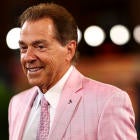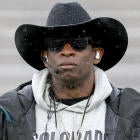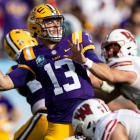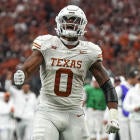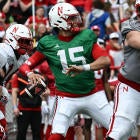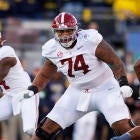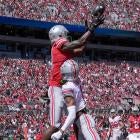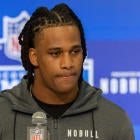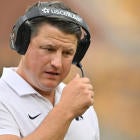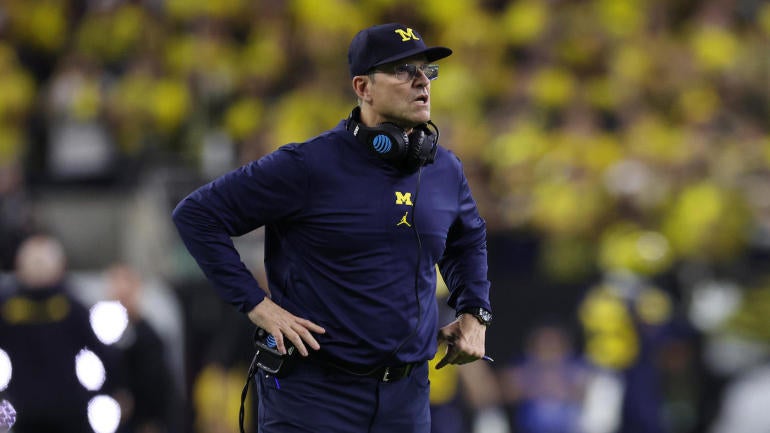
An NCAA rule that makes it more likely Jim Harbaugh could be charged with major NCAA violations has been at the heart of the coach's contract negotiations with Michigan, sources tell CBS Sports.
Under the NCAA's coach responsibility provision, which was strengthened just one year ago on Jan. 1, 2023, Harbaugh would be charged with a Level I violation in the sign-stealing scandal if any member of his staff is found to have committed a Level I violation. The charge itself cannot be argued; however, the severity of the penalty can be debated before the NCAA Committee on Infractions.
The Level I finding would remain on Harbaugh's record no matter his level of compliance, monitoring or diligence in the matter. The modified rule is why Harbaugh's representatives have been seeking immunity from Michigan.
Harbaugh has interviewed with at least two NFL teams while he considers his future with the Wolverines. On Tuesday, he entered into negotiations with the Los Angeles Chargers to fill their head-coaching vacancy, according to CBS Sports HQ senior NFL insider Josina Anderson.
Wherever he lands -- including in the NFL with the Chargers -- Harbaugh wants full control. To this point, Los Angeles has been hesitant to give him complete personnel power, sources tell CBS Sports, which is why the sides have yet to come to an agreement.
Harbaugh has already completed an interview with the Atlanta Falcons and could be headed back for a second conversation in Atlanta on Thursday if the Chargers let him out of the building, sources tell CBS Sports.
Meanwhile, Michigan has come around in its contract negotiations with Harbaugh. The Wolverines are now willing to grant their coach immunity from termination for the two ongoing NCAA investigations into the program, according to 247Sports' Sam Webb.
Whether from an NFL team or Michigan, Harbaugh is expected to receive around $12 million annually. The Wolverines have reportedly offered a nine-figure overall contract.
Harbaugh's current Michigan contract includes a so-called "strict liability" clause regarding "for-cause" termination. It's boilerplate language in most contracts that states coaches can be fired for cause if they commit NCAA violations. However, the adjustment of the coaching responsibility bylaw has concerned Harbaugh's team.
If Connor Stalions -- the former Michigan staffer at the center of the sign-stealing investigation -- or any other current or former staff member implicated in the case is charged with a major violation, Harbaugh would automatically be charged with a Level I violation.
Stalions, who resigned on Nov. 3, is accused of running a scouting scheme in which he videotaped signs of future Big Ten and potential College Football Playoff opponents in violation of NCAA rules. It is not known whether Stalions is cooperating with NCAA investigators.
The previous interpretation of the bylaw presumed coaching responsibility, and the finding could be mitigated or dropped if a coach proved adherence to NCAA rules. The updated interpretation from last January makes violation of that provision absolute.
Harbaugh's legal team was concerned the language could lead to his firing if the misconduct of a staff member automatically translates to a Level I charge against the coach.
Yahoo Sports reported last week that Harbaugh was seeking immunity from being fired by the Wolverines if found guilty of NCAA violations. Yahoo also reported Harbaugh's representatives were lobbying that the new contract contain language mandating any question over NCAA violations go to a three-person arbitration panel.
The coach responsibility change was instituted by the Division I Board of Directors Infractions Process Committee as a way of streamlining NCAA cases.
Coaches seeking protection from NCAA findings is not unprecedented. Kansas basketball coach Bill Self has language written into his contract that shields him from being fired for major NCAA violations. Thomas Mars, one of Harbaugh's attorneys, posted to social media that every coach in the country will soon be seeking similar protections because of the new provision.
@DanWetzel points out that the NCAA’s new strict liability rule means every collegiate head coach is now at risk of being fired for cause if anyone on their staff commits a Level I violation. Expect a trend of head coaches seeking amendments to their existing contracts to exclude https://t.co/M9CPpbiXTq
— Tom Mars (@TomMarsLaw) January 18, 2024
"Even to the extent [schools] build into the contract that you're not going to be liable for this, Self got an extension," said Jason Montgomery, a sports law attorney based in Kansas City, Missouri. "This is the next iteration of that."
Harbaugh and Michigan are also under NCAA investigation for alleged recruiting violations during the COVID-19 dead period. That investigation was initiated before Jan. 1, 2023, however, having begun as far back as 2021. Harbaugh is being charged with a Level I violation for allegedly misleading investigators in that case.
The NCAA has indicated its opinion of Harbaugh's culpability in the recruiting case. Last year, NCAA vice president Derrick Crawford referred to the severity of the violations saying it "is not a cheeseburger." In the past, the NCAA has been criticized for making cases out of relatively minor violations such as buying a meal for a recruit.
Complicating matters is that the sign-stealing case is considered one of the first -- perhaps the first -- case to involve the strengthened coach responsibility rule change. The NCAA does not speak to ongoing cases and prohibits those involved from doing so.
The infractions committee did away with Michigan's negotiated resolution in August that would have resulted in a four-game suspension of Harbaugh in response to the recruiting investigation. The committee said the case must go through a full investigatory process. As a result, Michigan self-imposed a three-game suspension on Harbaugh to begin the 2023 season, which was meant to mitigate penalties.
In the sign-stealing case, the Big Ten imposed a three-game suspension on Harbaugh through the conclusion of the regular season. Michigan backed down on attempting to get a temporary restraining order allowing Harbaugh back on the field. The Big Ten agreed to end its investigation of Michigan as the school dropped its legal action against the conference.
With two investigations open simultaneously -- both of which carry possible major violations -- Michigan can be categorized as a "repeat violator" in the NCAA's eyes. That could lead to enhanced penalties.
"The off-the-field issues, we're innocent and we stood strong and tall because we knew we were innocent," Harbaugh said following the College Football Playoff National Championship win over Washington earlier this month.
Critics have asked why Harbaugh needs contract protections if he's proclaiming innocence. Besides the NCAA rule changes making it more likely Harbaugh could be fired no matter the level of his innocence, the Michigan coach has never had more leverage coming off a 15-0, national title-winning season.
In a recent case involving Florida State, coach Mike Norvell was able to disprove NCAA findings of coach responsibility violations.
Earlier this month, the NCAA declared that Norvell "set clear expectations regarding compliance with the football program" as an assistant coach was found to have committed a recruiting violation. That case began before Jan. 1, 2023.
According to NFL.com, potential NCAA penalties could follow Harbaugh to the NFL. However, any such penalty would likely be irrelevant to an NFL employer.
There is precedent. Ohio State's Jim Tressel resigned under pressure in 2011 amid the "TattooGate" scandal. Tressel was then suspended for the first six games of the 2011 season after being hired as a replay consultant by the Indianapolis Colts.
Anything short of a postseason ban here should be seen as a win by Michigan. As a matter of policy, the NCAA is averse to handing out postseason bans so not to punish innocent players who had nothing to do with the violations.
Last year, Tennessee was found guilty of 18 Level I violations under former coach Jeremy Pruitt. The school escaped a postseason ban, instead getting slapped with recruiting restrictions and paying an $8 million fine.
Michigan has received a notice of allegations in the first case involving alleged recruiting violations. At best, it is thought that case could be concluded by the middle of the year. The school has not yet received a notice of allegations regarding the sign-stealing probe.
Harbaugh could be on the hook for substantial legal fees if he chooses to remain at Michigan and fight both cases, sports law sources tell CBS Sports.














